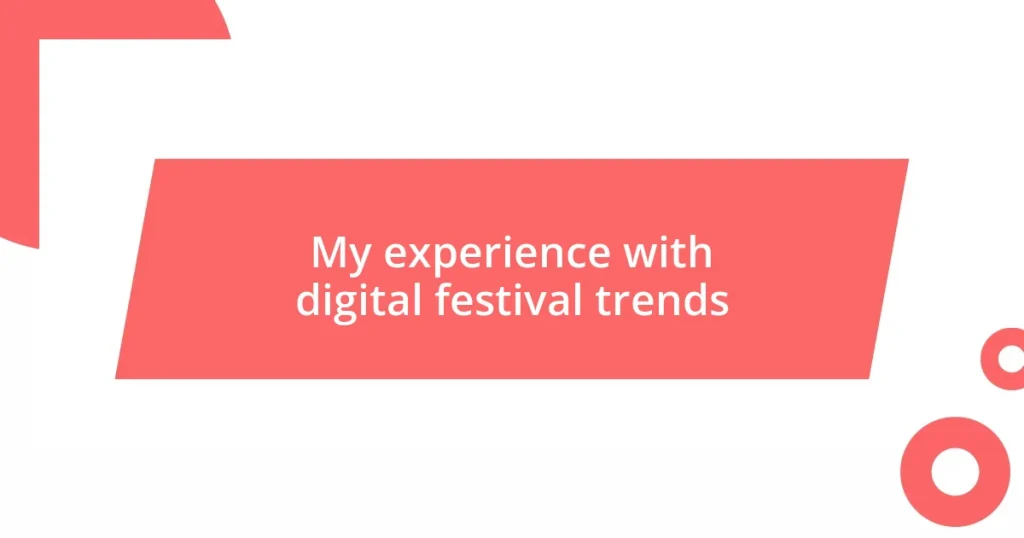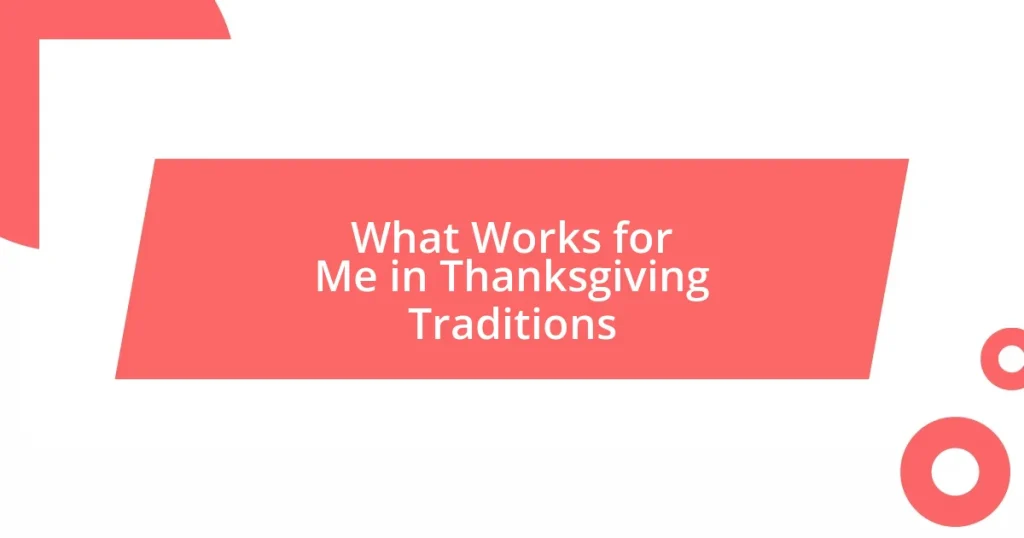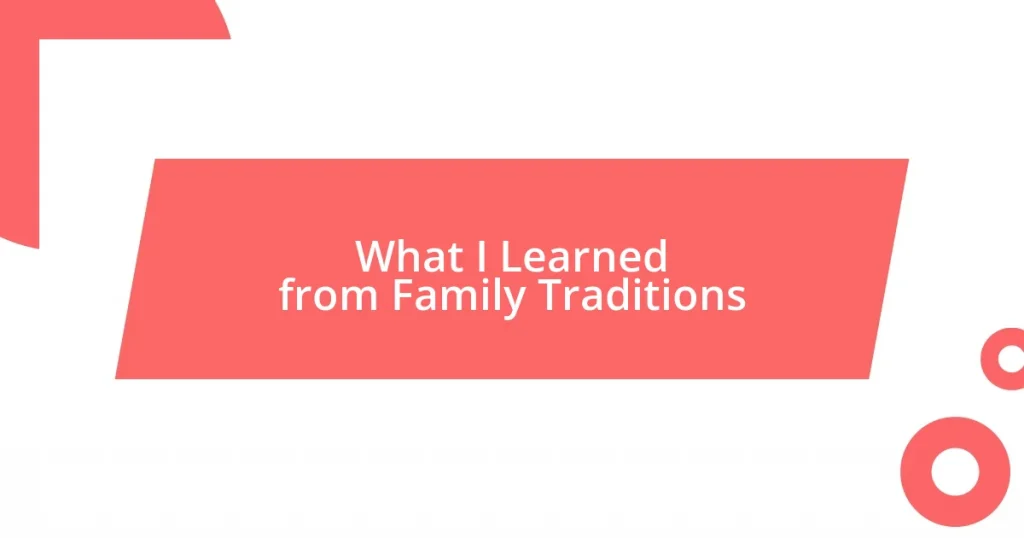Key takeaways:
- Digital festivals enhance accessibility and inclusivity, allowing global participation and reducing financial barriers.
- Emerging technologies like AR, VR, and blockchain are reshaping the festival experience, fostering engagement and providing fair compensation for artists.
- Future innovations focus on personalization and sustainability, creating tailored experiences while addressing environmental concerns.
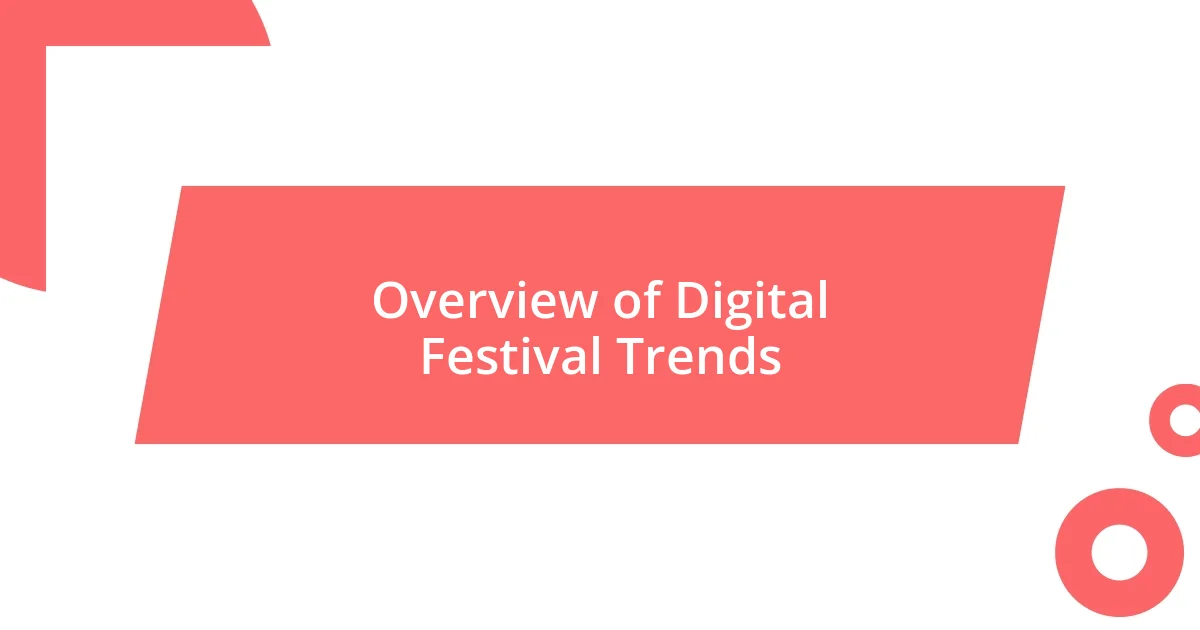
Overview of Digital Festival Trends
Digital festivals have transformed the way we connect and experience culture. I remember attending a virtual music festival from the comfort of my living room, feeling a mix of excitement and nostalgia for the live events that shaped my youth. It was fascinating how technology created an atmosphere that almost mimicked being in a crowded venue—only this time, I had my favorite snacks right at hand.
As I delved deeper into the digital festival scene, I noticed how inclusive these events have become. The ability to access a festival from anywhere in the world means that more people can unite over shared interests. Don’t you think it’s incredible that someone who might have never been able to afford a ticket can now dance to their favorite artists live online?
Moreover, the integration of interactive elements, like virtual meet-and-greets or real-time polls, added a personal touch I hadn’t expected. I still recall voting for setlists during a live stream, which made me feel like I was truly part of something larger. Isn’t it amazing how digital platforms can foster real-time engagement and community, even when we’re physically apart?
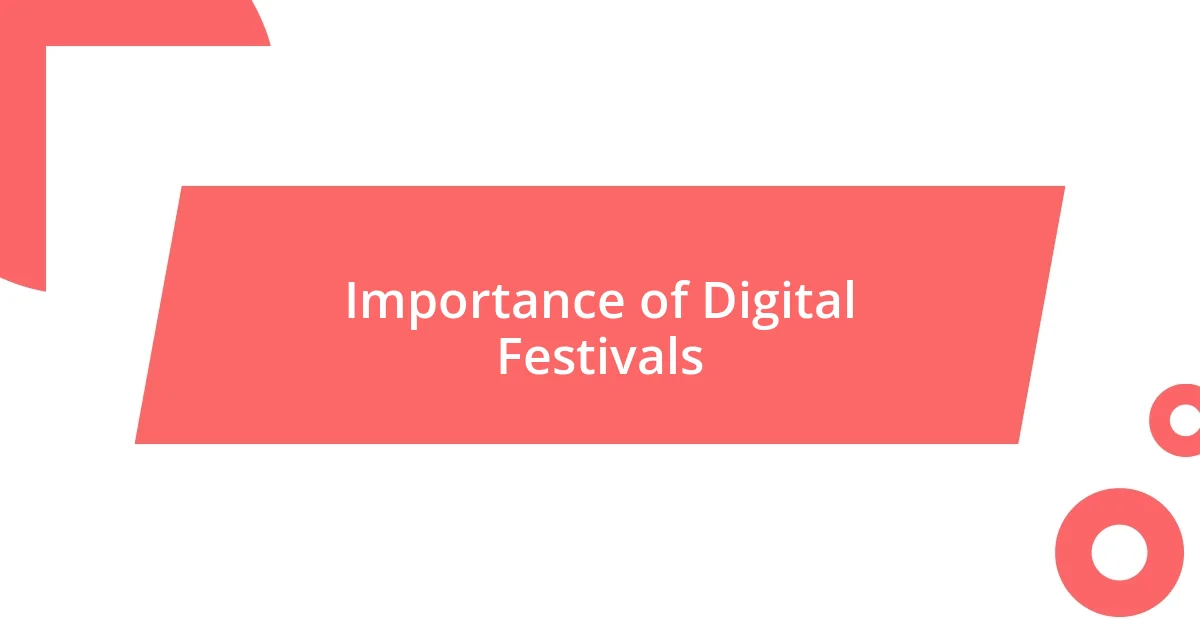
Importance of Digital Festivals
Digital festivals hold immense significance in today’s cultural landscape. They break geographical barriers, allowing anyone with an internet connection to experience music, art, and community without the financial and logistical hurdles of in-person events. I remember vividly logging into a digital art festival that showcased international artists. I sat there, mesmerized by the incredible diversity, feeling as if I was traveling the world without leaving my home.
- They promote inclusivity by allowing global participation.
- Digital festivals can reduce environmental impact by minimizing travel.
- They open doors for emerging artists who may not have access to traditional platforms.
- The ability to engage with content in real-time elevates the experience, fostering a sense of belonging among participants.
Ultimately, digital festivals offer a unique blend of accessibility and innovation that traditional events often can’t match, enriching our cultural experiences in ways I hadn’t anticipated.
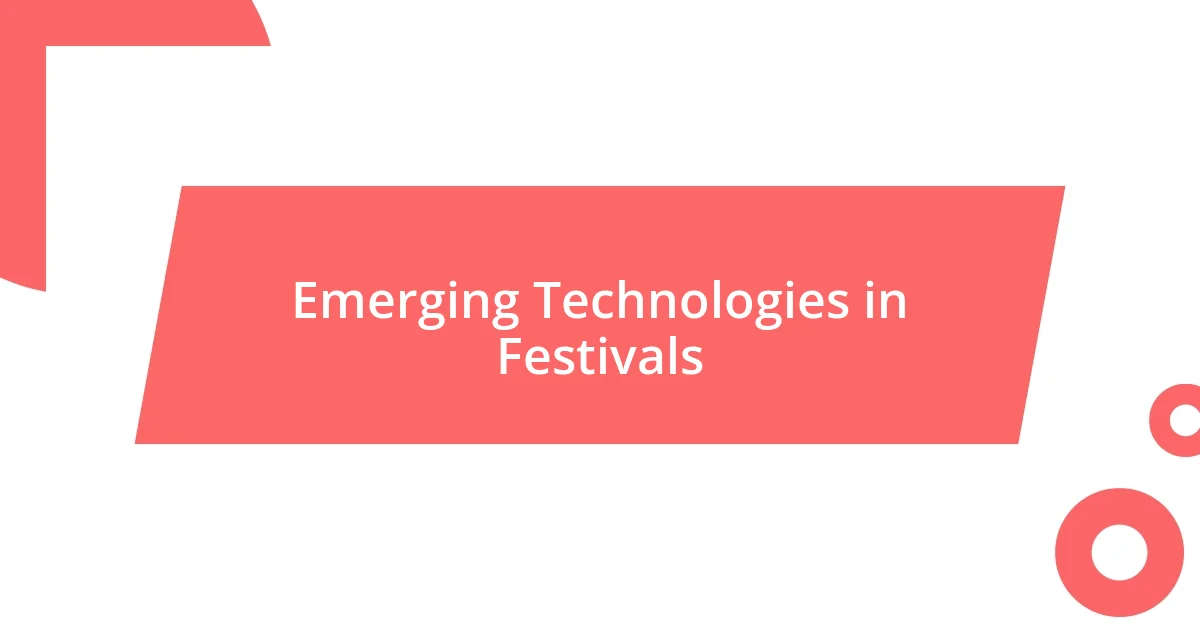
Emerging Technologies in Festivals
Emerging technologies are reshaping the landscape of festivals in ways I find truly exhilarating. Take, for instance, augmented reality (AR) experiences. When I attended a digital festival that incorporated AR, I felt a thrill as my favorite performers appeared right in my living room, dancing alongside me. It transformed the experience, blending my reality with the spectacle of live performance in a way I had only dreamed of before. Have you ever wished you could interact with artists on the stage? With AR, that dream feels tangible.
Moreover, virtual reality (VR) has taken immersive experiences a step further. At one festival, I donned a VR headset and was transported to a stunning digital venue that felt so lifelike. The 360-degree views made it seem like I was truly part of the crowd, even leading me to forget I was sitting on my couch. I was amazed at how technologies like these can create an emotional connection that surpasses the limitations of a traditional viewing experience. How do you think these advancements will redefine our interactions with art and music?
Blockchain technology is another critical player in this evolving landscape. It’s amazing to think about how artists and festival organizers can utilize blockchain to ensure fair compensation and authenticity for digital assets, like NFTs. I still remember being blown away when I purchased an NFT from an artist whose work I admire. The sense of ownership and connection I felt was unparalleled. I genuinely believe this technological evolution will empower both artists and audiences alike, making festivals an even more captivating experience.
| Technology | Impact on Festivals |
|---|---|
| Augmented Reality (AR) | Enhances user engagement by blending real and virtual experiences. |
| Virtual Reality (VR) | Provides immersive environments that replicate the festival experience digitally. |
| Blockchain | Ensures fair compensation for creators and promotes authenticity through digital ownership. |
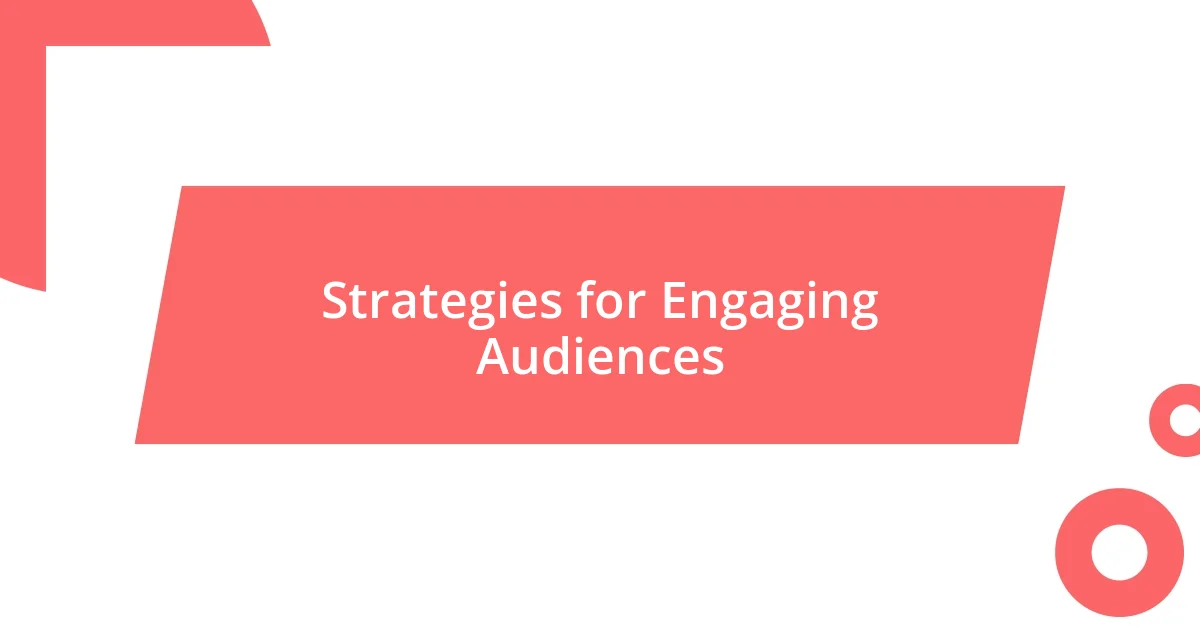
Strategies for Engaging Audiences
Creating engagement in a digital festival setting can be a game-changer for both the organizers and the audience. I remember a virtual event where the host interacted with viewers through live polls and questions. The excitement in the chat was palpable! It felt so much like a conversation rather than just a presentation, making me more invested in the experience. Have you ever participated in a live Q&A? It really does amplify the connection.
Another effective strategy is utilizing social media platforms to foster community. There was a digital music festival I attended where the organizers encouraged attendees to post their experiences with a unique hashtag. As I scrolled through the feed, I not only found joy in others’ snapshots but also felt a part of this vibrant, shared moment. The sense of camaraderie was incredible—wouldn’t you agree that sharing experiences helps us feel connected, even when miles apart?
Lastly, gamification is something I always find intriguing. At one festival, we could earn points for participating in different activities, like visiting virtual booths or engaging in challenges. I remember the thrill of seeing my name leap up the leaderboard! This approach not only kept me engaged but also motivated me to explore facets of the festival I might have otherwise missed. Have you considered how simple game mechanics could transform audience interactions in your own experiences?
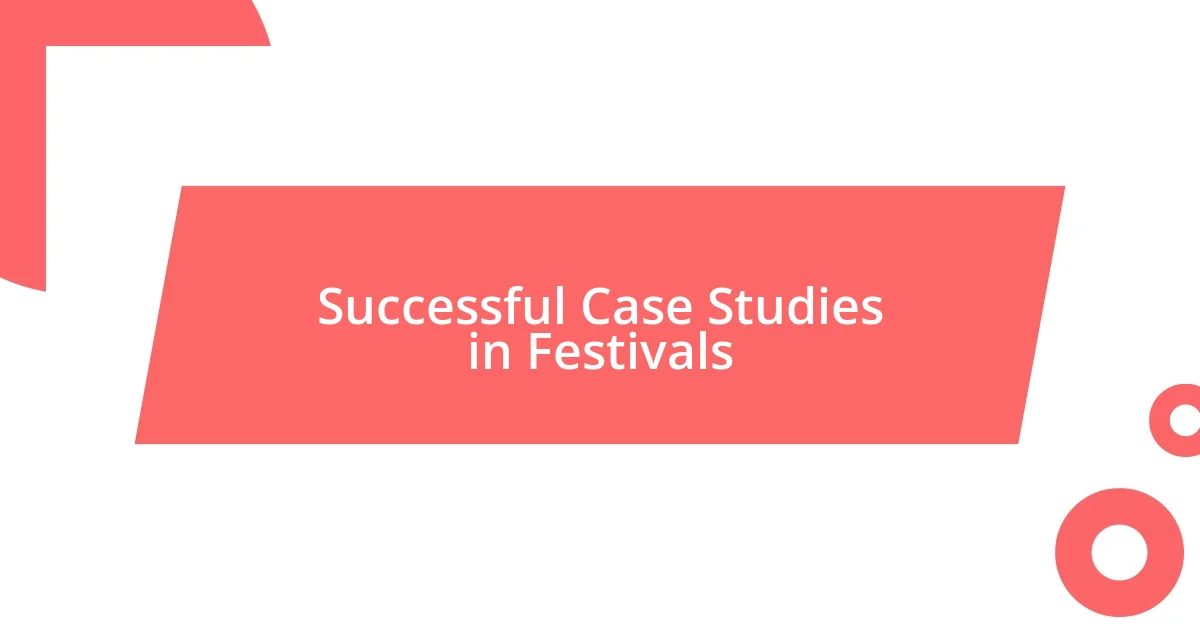
Successful Case Studies in Festivals
One standout example of a successful digital festival is the “Tomorrowland Around the World,” which utilized cutting-edge technology to create a breathtaking virtual experience. I vividly recall being mesmerized by its stunning visuals and the lively digital environments that felt so close to the real thing. It was hypnotic, and I found myself wandering through different stages, each crafted with such incredible detail. Have you ever felt like you were transported to another world just by watching a screen?
Another inspiring case is the “Fortnite Concert,” where Travis Scott performed live within the video game. I experienced pure awe as millions tuned in, witnessing a unique blend of gaming and music. The interactivity of being able to dance and move around during the performance made me feel part of something larger than life. Can you imagine the excitement of being in a crowd of virtual avatars, sharing that electric moment with everyone, regardless of distance?
Lastly, the use of blockchain technology in the “Decentraland Festival” stands out in my mind. I purchased a digital ticket as an NFT, which not only granted me access but also represented a new form of collecting memories. The combination of creativity and technology gave me a sense of ownership that I’d never felt before. Isn’t it fascinating how digital assets can change our relationship with art and events?
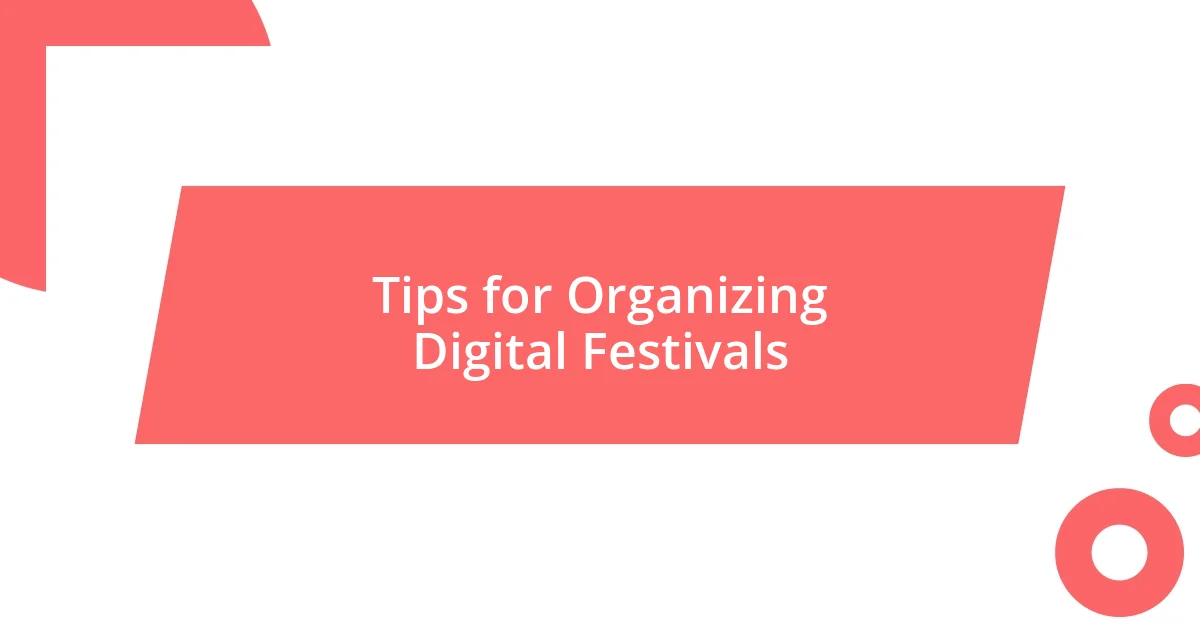
Tips for Organizing Digital Festivals
When organizing a digital festival, I’ve learned that setting a clear theme can steer the entire event’s direction. A few years back, I attended a festival focused on sustainability, and every aspect, from the speakers to the virtual booths, resonated with that message. The cohesive experience really tied everything together—don’t you think a strong theme helps attendees feel more engaged?
Technical logistics are crucial too. I vividly recall a digital event where the streaming platform crashed midway due to high traffic. It was a frustrating wait, and I felt disconnected from the experience. Choosing a reliable platform and having backup plans in place can save you from a mishap like that. Have you ever faced a technical hiccup during a virtual event? It can be a game-changer!
Another tip is to incentivize early registration. I remember registering for a festival that offered exclusive content or free merchandise to early birds. It felt like a special reward, and I was excited to spread the word. Offering attractive incentives not only boosts sign-ups but also creates buzz around your event. Wouldn’t you agree that a little motivation can go a long way in building anticipation?
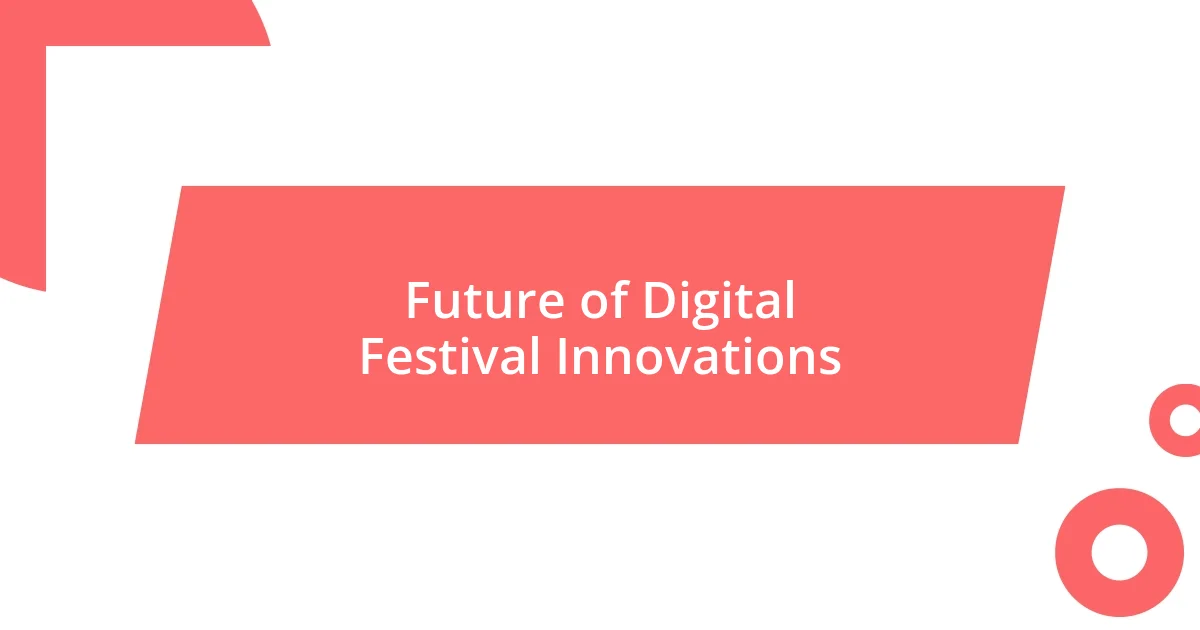
Future of Digital Festival Innovations
The future of digital festival innovations excites me because of the potential for personalization. Imagine attending a virtual festival tailored to your specific interests, where the algorithm curates performances and experiences just for you. I had an experience recently where a streaming service suggested a live DJ set based on my listening habits, and it added a layer of connection that made me wonder: how could this be expanded in a festival setting to create a more engaging, individualized experience?
Another fascinating trend I see emerging is the integration of augmented reality (AR). This technology can transform how we interact with showcases, enabling virtual meet-ups with artists through AR filters or environments. I remember using AR at an event that allowed me to view holograms of performers right in my living room. Have you ever wished you could step onto a stage with your favorite artist? The idea of sharing that moment in real time—albeit virtually—could change our expectations of engagement at festivals.
Sustainability will also play a key role in future digital festivals, reflecting our collective commitment to the planet. I once participated in a carbon-neutral online event that offset its emissions through various initiatives. The organizers shared clear metrics on their efforts, which made me feel proud to support something environmentally conscious. Isn’t it inspiring to think that as technology continues to evolve, we can celebrate our favorite events while also taking care of our planet?










